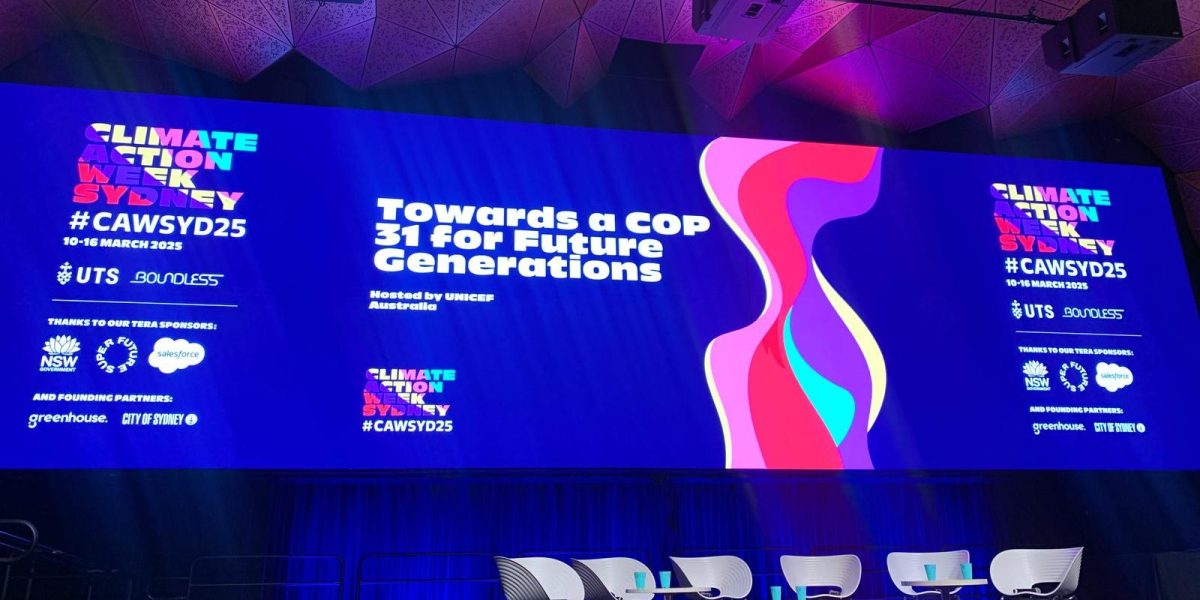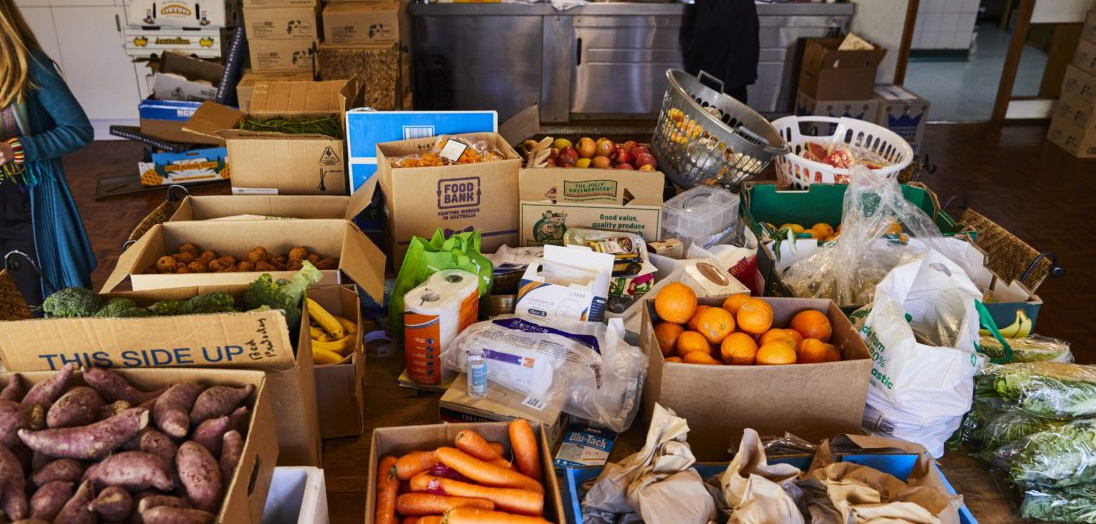Changing Climates, Changing Communities: Laudato si’ Reflections from Sydney’s Climate Action Week
24 March 2025|Charlotte Evans

In the aftermath of Laudato si’, our Community Engagement Coordinator, Lottie, shares her reflections from recent climate events in Sydney.
From March 10th – 16th, Sydney hosted its second Climate Action Week – “a series of community-led events across Sydney from all aspects of the climate action ecosystem”.[1] This week brought together much-needed collaboration and learning around the climate crisis, and a collective call to action.
For Lottie, and the mission of JRS Australia, climate change intersects and resonates with our work both in its impact upon forcibly displaced communities, and in other spaces and systems of injustice. Climate justice is a core tenet that motivates us towards advocating for, and building, a more just, safe, and sustainable future into being.
“A ‘greener’ future concerns not just carbon and climate metrics, but communities and care,” Lottie shares.
“Building a more just future – in the face of climate breakdown – means seeking not just to slow down anthropogenic (human-induced) warming, but also to seek more abundant, diverse, and equitable societies. This means living in greater harmony with both the nonhuman living world, and our human neighbours. This work includes cultivating communities, policies, and border regimes that care for people on the move, in the face of climate change and disasters, and in new host contexts.”
Future Generations Day
As part of Climate Action Week Sydney, Lottie was invited to attend a series of panel talks hosted by UNICEF Australia as part of “Future Generations Day”. This was the first time that a day dedicated towards young people has been included in the programme, and Lottie and others commended this particular focus on children and youth. It is well-known that the climate crisis affects us all, but grossly unevenly. Paying attention to these complexities and intersectionalities is hugely important, especially since women and children bear the brunt of climate change impacts, including climate-related displacement.[2]
The first panel, ‘Towards a COP 31 that works for future generations’, asked critical questions of representation, especially regarding young people’s voices and the challenges of not just gaining a seat at the table, but being listened to as credible voices. It is clear that such dynamics are particularly complex within the contested space of the COP process – the ‘Conference of Parties’, the UNFCCC’s annual climate conference. This panel also raised important questions around Australia’s bid to co-host COP31, in 2026, ‘with the Pacific’ – a notion riddled with contradiction and tension. For many Pacific Island nations, Australia is not perceived to be a credible leader of international climate negotiations, and ‘partner’ with the Pacific, while it continues to be the leading exporter of coal – and thereby exporting harm to its Pacific neighbours.
The evening event, ‘Climate change is changing childhood’, provided a lively discussion centred on the impacts of the climate crisis particularly for young people, coupled with a range of inspiring initiatives that youth activists and researchers, parents, and health practitioners, were doing in response. It was clear that young people provide important voices of lived experience about the lived and embodied impacts of climate change. Young panellists shared stories from their home communities and childhoods, including the Black Summer bush fires and extreme heat in Western Sydney. This was followed by members of Parents for Climate and Doctors for the Environment Australia explaining the greater vulnerability of children’s bodies to effects such as intense heat and smoke. These stories of lived experiences signified a clear message that climate change is not an issue ‘out there’, in different parts of the world, or out there in the future, but here and now.
One young member of the panel shared the sobering fact that Western Sydney is typically 6-10 degrees Celsius hotter than the rest of the city during extreme heat events.[3] This shocking statistic offers a glimpse into the gross environmental, social, and economic inequalities entwined within anthropogenic climate change. At JRS, many of the people we serve live in Western Sydney, an area of diversity but also greater deprivation. In this ‘Tale of Two Cities’,[4] paying attention to the built environment is critical – where the housing crisis, cost-of-living crisis, and climate crisis weave together to produce environmental harm to people’s lives. Certain bodies are therefore forced to live and endure unsafe environmental conditions, such as heat stress, without possessing the means to move or adapt their place of residence. For people living with visa precarity, or even made homeless, such impacts intensify.
It was encouraging to see these issues brought to the forefront of debate at the Sydney Alliance Pre-Election Assembly on Thursday 13th March – which fell within Climate Action Week. Climate Resilience and Energy were two of the three issues raised at the Assembly – alongside Housing, the key intersecting priority area, which concerned environmentally safe housing as much as affordability. The Sydney Alliance Assembly was, as always, an inspiring evening – and testament to the power of community mobilisation and solidarity. JRS Australia is an ally to environmental organisations in our home city of Sydney, and beyond, and sees building bridges of allyship as crucial to the work of seeking climate and refugee justice.
Our responsibility in the Pacific
The impacts of climate change and climate injustice manifest at different scales, from local neighbourhoods in Western Sydney to the threatened homelands of our Pacific neighbours. JRS has a mandate to serve where the need is greatest, and we recognise that climate change is particularly acute – and unjust – for communities such as low-lying island Pacific Island nations. For some of these communities, climate-related displacement presents a real and existential threat, raising a myriad of cultural, socio-economic, and emotional concerns. JRS Australia is seeking to listen, learn, and build our partnerships within this region, so that we can be better allies within this space, as these challenges are set to grow.
As part of this work, Lottie attended a ‘Climate justice and loss and damage in the Pacific’ conference, co-hosted by the Sydney Environment Institute and the UN Special Rapporteur on the Right to Development, Professor Surya Deva. From a day of talks, ranging from multispecies justice to community organising and climate finance, the intersections with the debt crisis emerged as one of the key messages. Paying attention to historical and structural systems of injustice which have led not only to climate injustice, but also to models of economic dependency and debt in the Global South, is vital. Speakers made it clear that climate finance – for mitigation and adaptation, and for Loss and Damage mechanisms – must be accessible, targeted, and urgently increased.
Whether it’s the cost-of-living and housing crises in Western Sydney, or the structurally uneven and unjust patterns of debt and dependence across the Global South, the climate crisis is intimately entangled with economic structures and inequalities. Paying attention to the injustices within such experiences – at whichever scale they manifest – is an important and urgent task.
Where to from here?
Our work at JRS Australia has seen a growing portfolio of climate-related engagements, under Lottie (Community Engagement Coordinator and former Climate-Related Displacement Intern) and Amelia (Head of Policy, Advocacy, and Communications). Lottie and Amelia had the privilege of presenting some of their work at an international refugee conference in Indonesia, in late January (read more here), and we plan to host a mini-series of climate mobility events throughout the coming year, in the lead up to Australia potentially hosting COP31 in 2026.
A potential ‘Pacific COP’ on the horizon raises important questions about how we treat our neighbours – from geopolitical relations at the regional scale, to our own neighbourhoods in Sydney. What kind of role is Australia playing within the ‘Pacific family’, from its climate talk to its climate walk? And how might we build a more welcoming and liveable society in our own communities?
Lottie reflects on the connection between our work with vulnerable migrants and climate justice. “We must continue to ask how we treat the living world, our nonhuman kin and our human neighbours, if we are to build a more just future, for all,” she emphasises.
To learn more, visit our Climate Related Displacement page here.
References
[2] https://www.oikoumene.org/news/impact-of-climate-change-women-and-children-bearing-the-brunt
[3] https://www.climatechange.environment.nsw.gov.au/stories-and-case-studies/building-adaptive-capacity-heat-western-sydney
[4] https://regions.regionalstudies.org/ezine/article/housing-deprivation-in-sydney/?doi=10.1080/13673882.2021.00001084#:~:text=(2017)%20point%20out%20that%20the,western%20Sydney%20suburbs%20are%20highly

